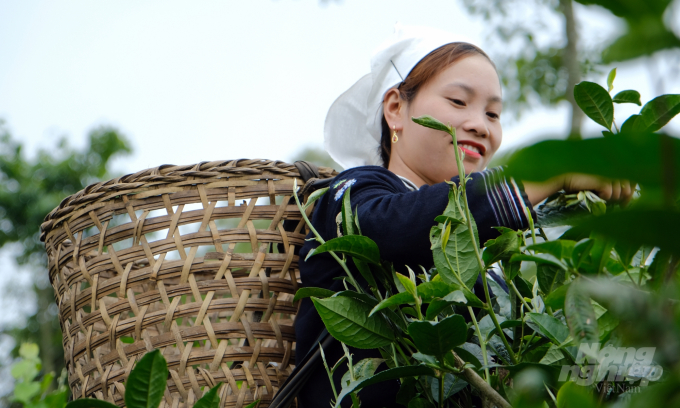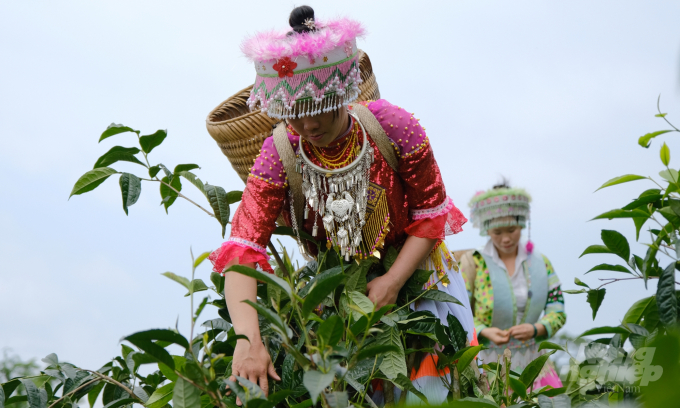June 3, 2025 | 04:09 GMT +7
June 3, 2025 | 04:09 GMT +7
Hotline: 0913.378.918
June 3, 2025 | 04:09 GMT +7
Hotline: 0913.378.918
Trieu Thi Thom from Dao ethnic group in Hong Thai Commune, Na Hang District used to not have a stable income. Many times, she had to sell her pigs and chicken to get money to solve some sudden business.
Things have changed since she was employed as a tea plucker in a local co-operative.
Thơm said that she heard about someone called Ba Uncle in Hong Ba Hamlet could earn VND8 million monthly thanks to tea but in her hometown, she just dared to dream about the sum.

Trieu Thi Thom from Dao ethnic group in Hong Thai Commune, Na Hang District is picking tea leaves. Photo: LB.
Like many Dao people, for years, Thom went to school in the morning and did farming work in the afternoon.
“It was very difficult to get a paid job here,” Thom said.
Five years ago, Dang Ngoc Pho, director of Shan Tuyet Son Tra Tea Co-operative planned to expand his business. He sought local labour who are good at harvesting tea. The tea is harvested by hands, not all leaves are picked during harvesting but only a few top young and juicy leaves with a portion of the stem on which they have grown and the so-called bud (or tip) – an unexpanded leaf at the end of the shoot.
Pho prefered to employ local workers as it helped him save labourers cost while created jobs for people from ethnic groups living in the neighbourhood.
“Since I worked for Pho, my life has been changed very much,”
Thom said, adding that she could pick up to 10 kg of tea leaves a day if working hard. She was paid VND 25,000 -50,000 for a kilo depending on the kinds of tea leaves.
Some other workers could earn more than VND 300,000 daily, Thom said.

Girls from ethnic groups of Dao and Mong get stable incomes from picking tea leaves. Photo: MP.
They usually get up about 5 am and start picking tea leaves until 9-10 am. After having lunch and taking a rest, they continue working from 3 pm to 5 pm or later.
Income generated from picking tea leaves was much better than doing other farming work, Thom said.
Organic tea
A few decades ago, people in Hong Thai Commune usually went to mountainous areas to chop down old-aged tea trees and then, sold the wood for a few hundreds thousand Vietnamese dongs, said Vi Ngoc Quy, head of the Na Hang District’s Agriculture Department.
Local authorities then stopped people from chopping the tea trees.
“Seeing the soil in Hong Thai Commune and some other communes is suitable for growing Shan Tuyet tea, the district authority had plans to develop tea industry early but local people were sceptical about it for long,” Quy said.

Director of Shan Tuyet Son Tra Tea Co-operative Dang Ngoc Pho stands next to an ancient tea tree. Photo: LB.
Director of Shan Tuyet Son Tra Tea Co-operative Dang Ngoc Pho said that in 2013, he happened to read about Shan Tuyet tea grown in Suoi Giang Commune, Van Chan District of Yen Bai Province could be sold for a few millions Vietnamese pet kilo.
Meanwhile, Shan Tuyet tea trees grew very well in the Hong Thai Commune, Na Hang District of Tuyen Quang Province.
Pho said that at that time, local people usually picked tea leaves to use daily but not for sale.
Pho asked them to tell him how to process the tea leaves and then, he tried. He gave his friends and relatives the tea he made as a present. It was said to have the typical taste and scent of mountainous land. However, not all tea he made had the same quality.
After five years, Pho’s tea business turned better and better as he invested in modern machines plus mastered tips to make good tea.
Tea leaves must be from ancient trees which are at an average altitude of more than 1,000 m above sea level. The tea leaves are picked entirely by hand. He only pays workers if the leaves they picked satisfy his requirements.
Now, there is more than 60 ha of Shan Tuyet tea in the Hong Thai Commune. The tea trees are also seen widely in communes of Sinh Long, Khau Tinh, Thuong Nong, Thuong Giap and Son Phu.
Shan Tuyet Na Hang tea was granted geographical indications, trademarks and origin tracing codes. Many enterprises from other provinces have signed contracts to consume the tea products.
Pho’s co-operative contributed to reducing poverty for farmers and the Hong Thai commune was granted title new-style rural area at the end of July 2020.
A month later, Shan Tuyet Hong Thai tea products were certified as an organic agricultural product by the Vietnam Organic Agriculture Association.
Dang Ngoc Pho, Director of Shan Tuyet Son Tra Tea Co-operatives said: “Tea farmers in Hong Thai now learn to nurse and collect tea correctly, strictly following organic farming process. We all want sustainable development like Shan Tuyết tea. A 20-year-old tea tree is half as tall as an adult but stays steady.”
Tea plucker Trieu Thi Thom said that she wished Shan Tuyet tea would grow across Hong Thai mountainous area so that she could earn her living with tea farming instead of growing other crops.
Translated by Hien Anh

(VAN) Novel process harnesses machine learning to reveal groups of genes that determine how efficiently plants use nitrogen.

(VAN) Several scientists and farmers are experimenting with soil treatment in some key durian-growing regions such as Cai Lay (Tien Giang), Dak Song, Gia Nghia, and Dak R’lap (Dak Nong).
/2025/05/25/4127-3-073637_820.jpg)
(VAN) Thanks to the promotion from an FAO-implemented project, vegetable production in greenhouses in Moc Chau has seen strong development, from 1.5 hectares in 2021 to nearly 50 hectares in 2024.

(VAN) FAO has recently supported USD 140,000 to implement the project 'Risk mitigation human-animal interface risks through disease control initiatives in pig farming.'

(VAN) The People's Committee of Tra Vinh province has approved an adjustment to the investment policy for the Green Hydrogen Plant project, increasing its area to approximately 52.76 hectares.
![Reducing emissions from rice fields: [2] Farmers’ commitment to the soil](https://t.ex-cdn.com/nongnghiepmoitruong.vn/608w/files/news/2025/05/05/dsc08881jpg-nongnghiep-140632.jpg)
(VAN) Clean rice cultivation model in Thuong Tan commune, Bac Tan Uyen district, is assisting local residents in achieving sustainable agriculture by substantially reducing costs, increasing productivity, and protecting the environment.

(VAN) At the conference to disseminate Resolution No. 68, AgriS introduced its digital agricultural ecosystem and reaffirmed its commitment to accompanying the Government in promoting private sector development and sustainable agriculture.